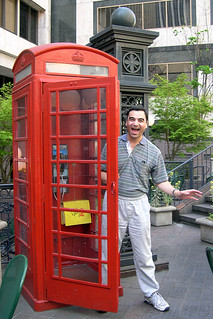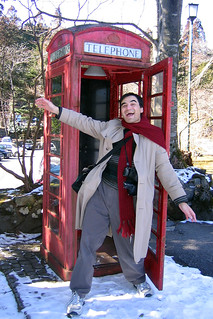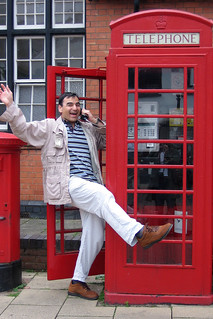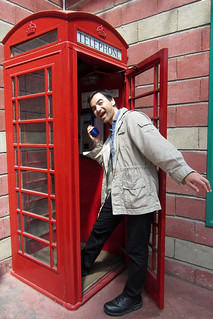

| Archive Blog Cast Forum RSS Books! Poll Results About Search Fan Art Podcast More Stuff Random |
|
Classic comic reruns every day
|
1 {photo of me sitting on top of a mountain}
1 Caption: Be yourself
|
First (1) | Previous (3333) | Next (3335) || Latest Rerun (2895) |
Latest New (5380) First 5 | Previous 5 | Next 5 | Latest 5 Annotations theme: First | Previous | Next | Latest || First 5 | Previous 5 | Next 5 | Latest 5 This strip's permanent URL: http://www.irregularwebcomic.net/3334.html
Annotations off: turn on
Annotations on: turn off
|
 Me in Seattle, USA. |
Recently we had a guest speaker who was a somewhat famous media personality. Gretel Killeen is probably best known in Australia for being the host of the reality TV series Big Brother Australia. I'm sure many of you would agree that, in isolation, you'd expect such a person to be pretty vacuous. But Killeen has a respectable background as a journalist, documentary maker, author, and stand-up comedian, for which she should also, or perhaps even rather, be famous. Anyway, the topic of her talk was advertised as "Authentic Leadership". I was curious enough to attend.
I am very glad I did, because her speech was well prepared, diverse in its scope and subject matter, funny, moving, and inspiring. The basic premise of "authentic leadership" can be summed up in an old quotation: To thine own self be true. As Killeen put it early in her talk, if you want to display leadership qualities in a job situation, you are best off doing it in a way that meshes with your personality, and accords with how you would behave outside of work in your normal social life. You then come across as genuine, and people can trust what you say.
She said that some people adopt personas when they go to work. They might speak up when something bothers them outside work, but become yes-men in the office. Or they might compromise their ethics to avoid problems with the boss. Or they might not speak up with bold ideas in meetings for fear of being shouted down or ridiculed. Killeen's basic message was that you need to allow yourself to be the real you at work, both in order to feel comfortable in your job, and to relate to co-workers in an atmosphere of mutual trust and respect.
 Me in Nikko, Japan. |
What sort of other things has Killeen done in her life? She spent time in Afghanistan and Iraq, making documentaries about the wars there. She spent time in sub-Saharan Africa, helping in HIV affected communities. She campaigned against the mutilation of girls in India because they or their families refused to let them get married around age thirteen or so. Some of the stories she told were truly horrible, but she was there and she was making a difference because that was what was important to her.
The idea of being true to yourself confronts the idea of conformity. At some level, everyone wants to be liked, and one way to feel that is to avoid being singled out, and potentially criticised, for being different. This is a big driver for young people and is why so many of them follow fashion and social trends. If you don't conform, you'll get picked on. (There are various counter-cultures which criticise people for being conformist, but these are the exception, not the rule.) On another level, people want to be unique and distinctive. A common result of these competing priorities is that many people adopt the trends that other people are adopting, because "that's how they are being different and unique". A specific example Killeen brought up was that tattoos used to be seen as rebellious and non-conformist. But now everyone is getting tattoos... to show how rebellious and non-conformist they are.
This is one of the potential issues of being yourself. Behaving differently from the crowd makes you stand out. So to do so, you need to overcome the fear of being criticised. This is something I have learnt myself over the years. Some time ago I wrote an annotation in this very webcomic about daring to be stupid. If there's something you want to do, give it a try! People might criticise you or think you're stupid for doing something you want to do, but you know what? You're doing something different because it's something you want to do, not because it's something everyone else expects you to do, and whose opinion is more important to whether you're enjoying yourself or not?
 Me in Stratford, UK. |
At this point in her talk, I was basically nodding in agreement with Killeen. But then she came up with something I hadn't considered before. She said it's easier to be yourself in some cultures, and as an example, it's much easier in the USA than in Australia. American culture celebrates diversity and individual drive and success. Australian culture, on the other hand, likes to think of itself as egalitarian. While this sounds good in principle, one manifestation of this is the tall poppy syndrome, in which people who are successful and rise above the average are criticised for their success. People who stand out from the crowd are resented and, if they can be, dragged back.
Killeen launched into a full-on criticism of this aspect of Australian culture. "You're different and successful? How dare you stand out! Get back here with the rest of us!" In the USA, on the other hand, people can be distinctive and different, and it is more accepted. And if they become successful through their differences, they are admired. You can be yourself and make a name for yourself in the USA, but it's harder and more demoralising to try the same thing in Australia. She said the result of this is that, in general, people in the USA are more friendly and more genuine that people in Australia.
I hadn't thought of the differences between Australian and US culture in this way before, and I have to admit it makes a certain amount of sense. For all the stereotypes of the crass, loud-mouthed American tourist who always wants their way and is not afraid to show it, I always read in various places that when Australians visit the USA they find the local people to be incredibly friendly, easy-going, and natural. As a stranger, you can strike up a conversation with an American with ease, and they will genuinely be interested to talk to you, to learn where you're from, and to wish you a good time. The same cannot as easily be said for Australians (in general). Americans are more used to doing what they want than Australians are, Americans are more used to standing out from the crowd, making a fuss, getting their way, and not being criticised for doing so. Australians are more likely to feel they are being scorned and criticised if they do these things, so they tend to keep a lower profile.
 Me in Paris, France. |
Killeen's message to us, as an audience of Australians, was that we should ask ourselves if we are being true to ourselves when we interact with people, or if we are adopting a conformist role. And if the latter, maybe we could try expressing ourselves more openly. Not brashly or rudely, but honestly. And get out there and try things you want to try. Yes, you might suck at it, but you'll be having fun and you won't be looking back in twenty years and wishing you'd done it.
I wanted to learn Italian, and now I am doing so. For a long time I wanted to be able to play an instrument, so a couple of years ago I dropped in at a music school. This July I'll be performing at my first concert. I wanted to write stuff about science, and about things that motivate and inspire me. Ever since I was a kid, I wanted to make comics...
|
LEGO® is a registered trademark of the LEGO Group of companies,
which does not sponsor, authorise, or endorse this site. This material is presented in accordance with the LEGO® Fair Play Guidelines. |